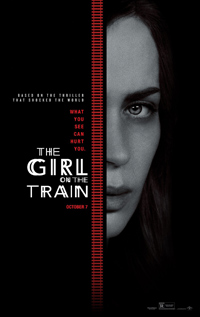Those Who Love Me Can Fake the Train: Taylor’s Silly Soap Opera Thriller
 Actor turned director Tate Taylor proves to be even less adept crafting mystery thrillers than he does insincere period melodrama with his third feature, The Girl on the Train, an adaptation of the bestselling pulp novel by Paula Hawkins. Audiences expecting something akin to David Fincher’s Gone Girl (Hawkins’ novel initially drew comparisons to scribe Gillian Flynn, much to her chagrin) will be quite disappointed with this asinine thriller, which initially promises a trio of stalwart female characters, but abruptly and unceremoniously sells them out in honor of a poorly executed grand reveal. Hollow and mercilessly superficial in its characterizations, this Hitchcockian wannabe mystery wastes a talented cast (particularly a sometimes convincing performance from Emily Blunt) on a clunky bait and switch conceit all the more disappointing because of several elements promising otherwise.
Actor turned director Tate Taylor proves to be even less adept crafting mystery thrillers than he does insincere period melodrama with his third feature, The Girl on the Train, an adaptation of the bestselling pulp novel by Paula Hawkins. Audiences expecting something akin to David Fincher’s Gone Girl (Hawkins’ novel initially drew comparisons to scribe Gillian Flynn, much to her chagrin) will be quite disappointed with this asinine thriller, which initially promises a trio of stalwart female characters, but abruptly and unceremoniously sells them out in honor of a poorly executed grand reveal. Hollow and mercilessly superficial in its characterizations, this Hitchcockian wannabe mystery wastes a talented cast (particularly a sometimes convincing performance from Emily Blunt) on a clunky bait and switch conceit all the more disappointing because of several elements promising otherwise.
Twice daily on the Metro North commuter line, professional businesswoman Rachel (Blunt) spies on a blonde lady she’s become obsessed with, a young housewife named Megan (Haley Bennett), who seems to have the perfect existence with her husband Scott Hipwell (Luke Evans). Looks, however, can be deceiving, and Megan, an aspiring art gallery director, is bored at home with her husband, who has her babysitting for their neighbors Anna (Rebecca Ferguson) and Tom (Justin Theroux). We learn bits and pieces about Rachel as she chugs back and forth on the train, and as it turns out she used to be married to Tom, but her inability to conceive (paired with a predilection for booze) ruined their marriage…which explains why she can’t stop calling Tom and Anna incessantly on a daily basis. Worse, she can’t help but feel betrayed by Megan when she sees the woman canoodling with another man (Edgar Ramirez) one sun dappled day, and something inside her snaps…or so it seems, since she wakes up bloodied and dazed, while Megan has simultaneously gone missing.
The morbid construction of Emily Blunt’s Rachel initially feels like just the right material to end up in screenwriter Erin Cressida Wilson’s hands, a scribe responsible for retooling Anne Fontaine for Atom Egoyan’s 2009 psychological thriller Chloe, and to even better effect, the fractured femmes at the center of Steven Shainberg’s earlier films Fur (2006), and especially Secretary (2002). Blunt’s bleary eyed drunkard, whose omniscient narration informs us of her ragged identity crisis (she’s no longer the ‘girl’ she once was, but her inability to give birth somehow infinitely infantilizes her, according to her naive understanding of what happiness or marital bliss looks like) is a sallow, increasingly pathetic heroine demanding sympathetic zeal from the audience, and instead we’re mostly compelled to find out exactly what she is capable of.
An obsessive, morally questionable protagonist, the titular apparatus (ominously recalling Strangers on a Train and its effective dueling personas) eventually becomes one giant McGuffin, eventually a vessel of convenience in a narrative which sloppily stacks them haphazardly atop one another. For as convincing as Blunt manages to be as an alcoholic about to hit rock bottom (this is a far cry from more glamorous representations of functional boozehounds, Charlotte Rampling of The Verdict, for instance), her performance actually is responsible for creating an even wider rift between the initial semblance of narrative integrity and a shallow reveal which negates any kind of groundwork laid concerning Rachel. Initially, this isn’t the case, but it quickly becomes apparent supporting characters, like the borderline nymphomaniacal Megan, and the coldly Aryan Anna are merely a lazy conglomerate of character tics.
Blazing through supporting bits are thankless moments for Laura Prepon and Lisa Kudrow, but a sardonic Allison Janney manages to enliven proceedings whenever she appears to cast doubt on the dubious perspective of Rachel. The men are all stock characters, all crudely hewn cads further exemplified by wooden, soap opera styled turns from Luke Evans, Edgar Ramirez, and Justin Theroux (character surnames like Hipwell and Abdick enhance a sense of silliness, like random words mashed together for a banality’s sake).
In its desperation to trick its audience, however, The Girl on the Train becomes laughably insipid, degrading the intelligence of its audience and any kind of authenticity for its characters. What’s most disappointing is the amount of technical prowess behind the scenes, like an uncharacteristic score from Danny Elfman, while Danish DP Charlotte Bruus Christensen manages to make this a handsome production of autumnal discontent in the New York suburbs.
★/☆☆☆☆☆


